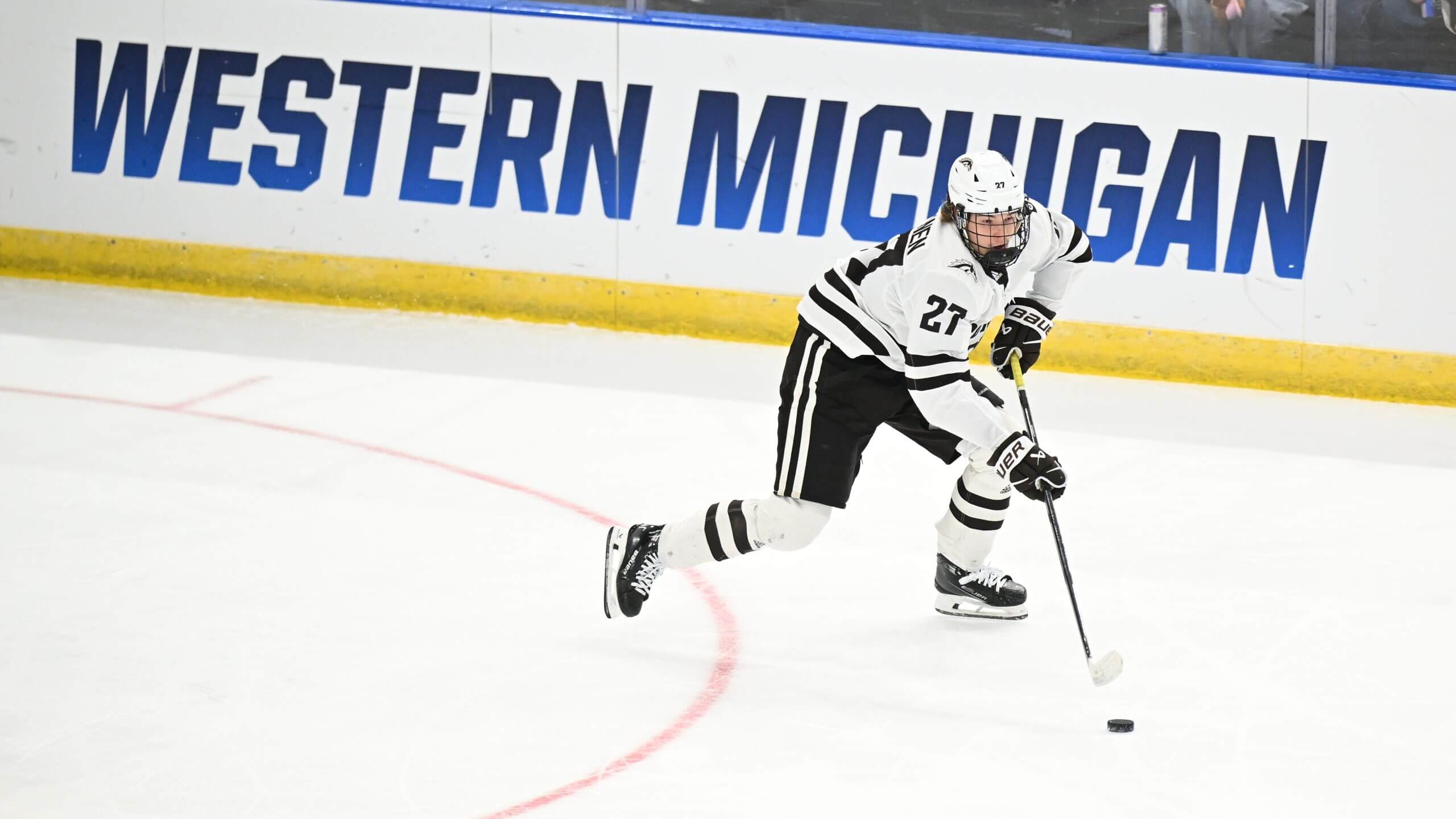
The first time Pat Ferschweiler and his staff at Western Michigan University saw Joona Vaisanen play, he was playing U18 hockey in Finland for Kiekko-Espoo in what should have been his draft year in 2022, and they watched him on video.
That summer, he went undrafted, as almost all kids playing at that level at that age do. The following season, after making the jump to their U20 team, he passed through the draft for a second time. He wasn’t even on the radar, never appearing on NHL Central Scouting’s rankings of international skaters in either year.
Advertisement
Ferschweiler and his Broncos staff never did see him play live when they recruited him. At the time, they recruited him on “If it goes well, it’ll be one year in North America, and if it takes a little more time, it’ll be two years.”
Vaisanen was fine with that. In 2022, he wasn’t a top prospect and the Broncos hadn’t yet established themselves as a top program under Ferschweiler (who was hired in 2021 and took over a program trying to find its footing in the NCHC and without a conference championship since 2012 in the CCHA).
Three years later, the Broncos are heading to their first-ever Frozen Four with their first-ever NCHC title, and Vaisanen, a 20-year-old freshman right-shot defenseman, has played a pivotal role.
As they prepare to meet the defending national champs from Denver in the national semifinal on Thursday, Vaisanen has registered 24 points in 40 games.
His plus-23 rating tops the team. He has averaged 20 minutes per game. When Western Michigan defeated Denver for the NCHC title, he played almost 29 minutes in their 4-3 overtime win.
In the end, it did end up being one year in North America before Ferschweiler and his staff brought him in. That year, he also led his team in plus-minus, finishing plus-31 as a rookie defenseman with the Dubuque Fighting Saints in the USHL. He also registered 40 points in 53 games for Dubuque, fourth among all USHL D.
That one year changed everything for him. He played his way into his first IIHF event for Finland at the age of 19, making their World Junior team. At year’s end, he was even named to the USHL First All-Star Team.
And he answered the one big question Ferschweiler and his staff had when they first recruited him.
“We saw the skill, we saw the smarts, but then it’s always a question of ‘How does it translate to the smaller rink in North America?’ And (he) absolutely crushed the USHL last year with his skating, and his decision-making, and his deception, which are all super high-end,” Ferschweiler said.
Advertisement
In his third and final crack at the NHL Draft, he also played himself onto the radar, and NHL Central Scouting finally ranked him, slotting him 83rd on their final list of North American skaters for the 2024 class.
The Pittsburgh Penguins took him, selecting the 6-foot, 185-pound defenseman in the sixth round with the draft’s 175th pick.
For the Pens, it was all about his hockey IQ.
“It’s something that I value and we value as an organization at a very high level,” assistant general manager Jason Spezza said ahead of the Frozen Four. “(With Vaisanen), it was having lots of volume and trusting that over time we’ve watched him enough that we’re confident in our evaluation of him and that we feel he’s going to get better as he continues to climb. And he’s showing that this year just because of the intelligence of his game. He looks to the middle of the ice. He seems to know when to cut his losses and make a safe play and when he has to try to create. I think he had a lot of signal towards him in terms of hockey sense … and that’s why we picked him.”
But there were other, quieter draws too.
Spezza calls him a “sneaky-competitive player.”
“It’s probably not a word you’d use by just watching him but it was one of the big draws to us as a prospect is just how competitive he is, and he pays attention to the details and I think that’s why he has done well in both (Dubuque and Kalamazoo),” Spezza said.
In Dubuque, former Fighting Saints general manager Kalle Larsson told The Athletic before the draft that Vaisanen was the best defenseman he’d had there and predicted he would be even better with better players “because his brain was almost too good for his teammates at times.”
“(Vaisanen’s) also just scratching the surface,” Larsson said. “I’m a big fan.”

Vaisanen has registered 24 points in 40 games, and his plus-23 rating tops the team.
Now that Ferschweiler has spent a season getting to know him and actually seeing him in person on the ice, he has also turned into a big fan, describing him as “extremely humble” and “extremely hardworking.”
“Superstar of a young man,” he said when asked what he’d learned about Vaisanen this year. “He could not fit in better. … Loves hockey and you probably say to yourself ‘Well everybody loves hockey’ — they don’t. Some like it, some play because they’re good at it. This kid loves to come to the rink and he’s a true joy to coach.”
Advertisement
On the ice, though Ferschweiler’s “expectations were high for him to run the power play” after his big season in Dubuque, he also learned what Spezza and the Pens had.
“What has really stuck out to me is not his skill, is not his hockey IQ, not his deception — we knew about all of that — but his competitiveness is off the charts as well and I think that’s what allowed him to succeed so quickly in North America and so quickly in college hockey,” Ferschweiler said. “He’s hyper competitive and probably underrated defensively with that because he’s not a physical defender but he’s a great defender with his feet and with his stick so he still kills a lot of plays and he transitions so fast out of those kills. I think sometimes the quality of his defensive play is missed by some people. But it’s certainly not missed or underappreciated by us.”
Throughout the year, Spezza made an effort to line up some of his travel to see Vaisanen and WMU play a few times on the road.
As an organization, Spezza said the Penguins are trying to be very hands-on with their prospects, which he believes starts with developing a relationship with each of their coaches so that their coaches trust that they’re talking to their players about the same team concepts, areas of improvement and goals. Most of those touchpoints are handled by player development lead Tom Kostopoulos, who keeps in touch with both the player and his coaches throughout the year.
Though the Penguins can’t get on the ice in-season with NCAA players like they can with junior ones, their areas of focus with Vaisanen have been two-fold: Self-evaluation and video packages delivered to the player to highlight things to pay attention to.
As a 6-foot defenseman, they’ve emphasized gaps.
“Any of the guys that are NHL players with his profile, I think they’re elite at making sure that their feet are good, gapping up, taking away time and space. He’s not going to overpower guys physically, though he will kind of engage,” Spezza said. “Gapping is one of the biggest things that we try to help him with, just kind of where you are on the ice, when to close, when not. Making sure that he’s working off of the puck to put himself in a good position with the guy that he’s checking so that when he gets him he’s close and he can close quickly.”
Advertisement
So far, so good on all fronts.
“He’s a guy that we’re definitely happy with how his season’s gone and him having a big role on a top team is a testament to the work he has put in,” Spezza said.
Vaisanen feels his game is in a really good spot right now as well, and said he feels like he has a lot of momentum both at WMU and with the Penguins.
Vaisanen said he’s had the hockey IQ piece his whole life, and that he believes his game smarts come from playing a ton of different sports growing up, including hockey, soccer, basketball and baseball.
But he’s more than his smarts as well.
“I’m an offensive defenseman, but I do look at myself as a two-way defenseman too. I’m a guy that can skate very well, move the puck, and be a playmaker,” Vaisanen said.
When he looks back on how far he has come, he lets out an “oof.”
“I was super late,” Vaisanen said. “I was always a late bloomer and really small as a kid so I was kind of struggling with the size and just everything honestly but when I was playing back home in Finland in the U20 league, that’s kind of where I kind of popped off and saw my value and potential. And that’s when some of the interest came and I just kept that going and now I’m here.”
And here is the reigning plus-minus king for both Dubuque and Western Michigan.
“We just gotta get him to lead the Penguins in plus-minus one year and we’ll be happy,” Spezza said, laughing.
(Photos courtesy of Western Michigan Athletics)
This news was originally published on this post .








Be the first to leave a comment